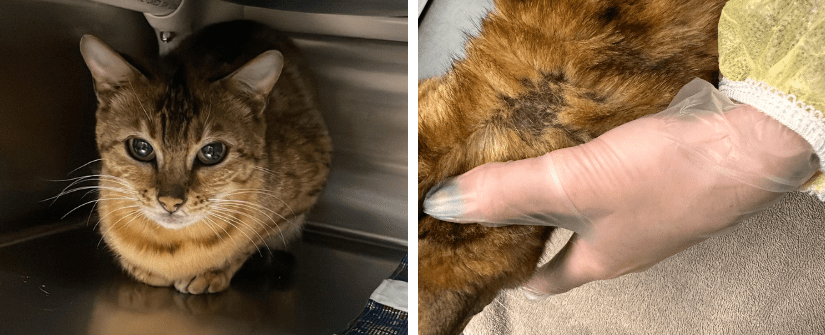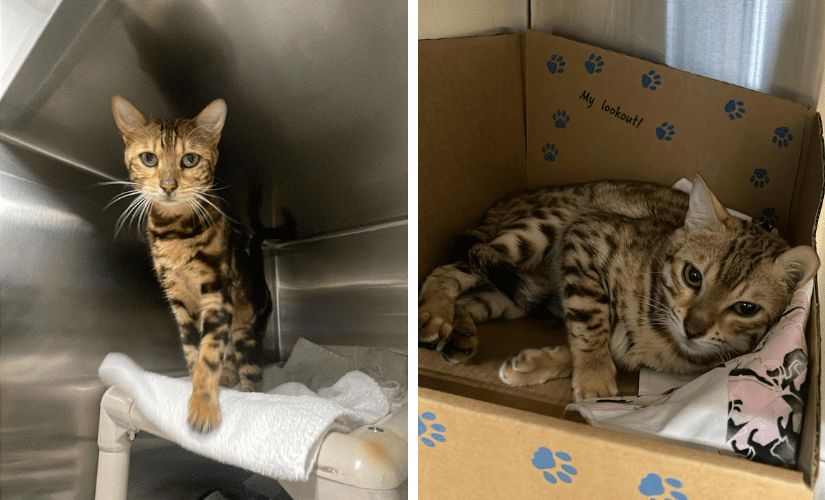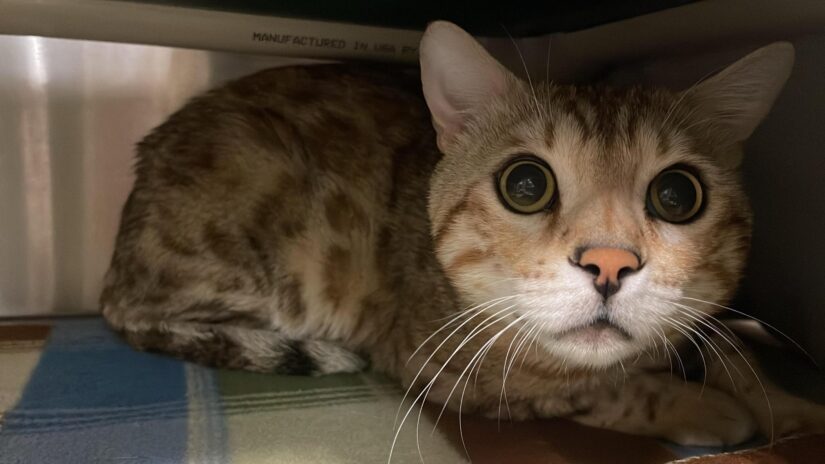It was a newsworthy rescue – 34 Bengal cats kept in cages, some for most of their day, underweight and in distress.
One couple who heard about the Bengal cats knew they could help. “We had a Bengal cat until 2021 when she passed,” says Kathleen. “We were ready to bring another cat home, and we thought our experience could be put to good use. Bengal cats have more energy, are more playful and are much more vocal than other cats.”

Kathleen explains, “When we were driving Pixel to her new home, she let us know she wasn’t thrilled to be in the car and was ‘chirping’ as I call it in the back seat. I started talking to her to make her more comfortable.” Soon Pixel was reaching out her paw to make contact with Kathleen’s arm and falling asleep.
Pixel settled into her new home very quickly. “It is recommended to keeps cats in a smaller room when they are first brought into a new home and let them slowly get used to their environment,” says Kathleen. “When we brought Pixel into our home, we shut the doors to all the rooms and let her wander around to see how she would react. She wasn’t nervous at all and didn’t try to hide. She was so calm we didn’t end up placing her in the smaller room and within a couple of days we had opened all the doors so she could have full access.”
![]()
One other thing people may not know about Bengal cats – they seek out attention much like a dog. “The other day I ran an errand in the morning,” says Kathleen. “I was gone for 40 minutes, and Pixel came down the stairs to meet me for the first time. Bengal cats do that every single time. Very cool to see her doing the same thing. I like to think it is to welcome her human.” Pixel also likes to play “fetch.” “She loves to get her cardio in by chasing her cat spring toy down the hallway.”
Pixel’s bio on the website hadn’t mentioned she was particularly affectionate, but Kathleen and her husband soon discovered she was a love bug. “She is constantly looking for us and will stand beside us ‘chirping’ until she is acknowledged and given a pet. In the morning, she finds us and gives us a head butt rub on our legs. Totally cute.”
Kathleen adds that although Pixel is a ‘Velcro cat,’ she is not a lap cat. “She loves to sit alongside you on the couch, but she won’t sit on your lap. She will put her chin on your lap, and part of her body. We call it a side or partial couch cuddle. She is happiest in a chair all by herself. The running joke is if you want to know which chair is the most comfortable, go find Pixel.”
![]()
Bengal cats are wild-hybrid domestic cats, a mix of wild Asian leopard cats and domestic breeds. Hybrids already living in our communities, like Pixel and those involved in this animal protection case, require highly specialized care. To ensure strong welfare for these animals, the breeding of hybrid cats should be regulated. The BC SPCA opposes the breeding of wild animals with domestic animals, as well as the breeding of wild animals in captivity as exotic pets. The importation, breeding, and keeping of exotic animals—such as Asian leopard cats and Servals, which are used to create hybrid cats—should be prohibited under the provincial Controlled Alien Species Regulation of the Wildlife Act.
BC SPCA investigation results in the seizure of 34 Bengal cats from irresponsible breeder
BC SPCA animal protection officers seized 34 Bengal cats from a property in Vernon on May 28, 2025, after a veterinarian determined all the cats met the definition of being in distress.
“We were alerted to this situation by someone who visited the property. They were considering buying a cat from the breeder and were concerned about the conditions the cats were living in. They contacted the animal helpline and an investigation was initiated,” says Eileen Drever, senior officer protection and stakeholder relations.
“This is yet another situation where someone is breeding animals in conditions that do not support their physical or mental wellbeing,” says Drever. “The officers who visited the property reported an overwhelming smell of ammonia in the rooms where these cats were housed, so intense their own noses were stinging. An ammonia gas test registered at the highest level, further proving that the ventilation and cleaning were insufficient.”
Drever emphasizes the dangers of ammonia exposure for animals, explaining that the exceptionally high levels detected on this property pose serious health risks. “These concentrations can lead to severe respiratory irritation and, in extreme cases, even ulceration of the eyes.”
In addition to the high levels of ammonia gas, the cats were kept in dirty cages with overflowing litter boxes. In some cases, there were also too many cats housed in one cage. “Bengal cats are typically larger than domestic cats,” says Drever. “Although they had access to a ‘catio,’ it was on a limited basis. Some of these cats spent most of their time in cages.”

“Most of the cats are fearful, but they were very brave during their intake exams,” says Shannon Paille, manager of the BC SPCA Kelowna animal centre. “We were able to get all the treatments done with light towel wraps and only some of them were growly. Bengals can be quite vocal.”
Paille says the veterinarian who examined the cats reported that almost all are underweight and some of the cats had diarrhea. “We have already been giving the cats regular treatments for skin issues but, because of some suspicious hair loss, they are also being tested for ringworm.” It appears that all the cats will need spay or neuter surgeries.
Caring for these cats requires a different approach. “Bengals can be very expressive cats,” says Paille. “They’re intelligent and energetic, so depending on the individual cat, they may require more stimulation and enrichment than other breeds.”

Bengal cats are wild-hybrid domestic cats, a mix of wild Asian leopard cats and domestic breeds. Hybrids already living in our communities, like those involved in this animal protection case, require highly specialized care. To ensure strong welfare for these animals, the breeding of hybrid cats should be regulated. The BC SPCA opposes the breeding of wild animals with domestic animals, as well as the breeding of wild animals in captivity as exotic pets. The importation, breeding, and keeping of exotic animals—such as Asian leopard cats and Servals, which are used to create hybrid cats—should be prohibited under the provincial Controlled Alien Species Regulation of the Wildlife Act.
At this time, it is unknown when the Bengal cats will be available for adoption.
